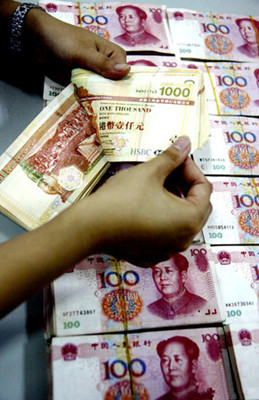香港金融
Going with the flow
順勢而為
Exposure to China is rising but the biggest risk comes from America
與中國大陸的接觸增多,但最大風(fēng)險(xiǎn)來自美國
IF INVESTORS are worried about the cloud of political uncertainty looming over Hong Kong, they have a curious way of showing it. Over the past five weeks, as a rancorous debate over the city's democratic future spilled onto its streets, there has been a flood of demand for its currency. The territory's de facto central bank, committed to a 31-year-old dollar peg, bought the $9 billion that streamed its way, to prevent the exchange rate from rising.
如果投資者擔(dān)心政治上不確定的烏云籠罩著香港,他們會用一種奇怪的方式表現(xiàn)出來。在過去的五周里,大街小巷都在針鋒相對地談?wù)撽P(guān)于這座城市的民主前景,也因此產(chǎn)生了大量對貨幣的需求。香港實(shí)質(zhì)上的央行,在和美元掛鉤的31個(gè)年頭里,給香港帶來了90億美元的熱錢,也借此防止匯率上升。

Explaining the sudden influx, Hong Kong's authorities pointed to technical factors such as dividend payments and mergers that had forced companies to buy the currency in bulk. But animal spirits were also part of the mix. An exchange-traded fund that tracks Chinese equities reported record inflows as punters chased China's still-rapid growth.
對于出現(xiàn)的資金突然涌入現(xiàn)象,香港當(dāng)局解釋說,例如股息支付和并購的技術(shù)因素會要求公司大量購入貨幣,這也因此導(dǎo)致了資金的突然涌入。但是動物精神也有是綜合原因中的一部分。當(dāng)投機(jī)者在市場中競逐中國依舊保持的高速增長,追蹤中國股市的ETF基金的資金流入量也刷新了記錄。
And then came an intriguing Vladimir Putin effect. Wary of financial sanctions over the Ukraine conflict, Russian companies, including OAO MegaFon, a mobile-phone operator, and Norilsk Nickel, a metals producer, moved some of their cash reserves into Hong Kong dollars—where, they believe, their money will be more insulated from American pressure.
另一個(gè)原因就是普京的影響。因?yàn)閾?dān)心烏克蘭沖突會引發(fā)金融制裁,包括移動電話運(yùn)營商OAO MegaFon和金屬制造商N(yùn)orilsk Nickel在內(nèi)的許多俄羅斯公司都把他們的現(xiàn)金儲蓄轉(zhuǎn)成了港幣。他們相信在這里,他們的錢會越發(fā)遠(yuǎn)離美國施加的壓力。
A common thread runs through both the politics and the economics. The uneasy balance that has fuelled Hong Kong's protests is the same thing that has made its financial system so attractive to global businesses and investors: the city boasts deep connections to China within a decidedly non-Chinese framework. Hong Kong is the best place for foreign investors to buy Chinese shares and bonds or lend to Chinese companies. It offers a wider choice of Chinese assets than anywhere else outside the mainland. In Hong Kong, unlike the mainland, investors are protected by a mature legal system and can move money in and out, unimpeded by capital controls.
在政治經(jīng)濟(jì)領(lǐng)域有一個(gè)普遍的思路。香港以一種具有決定性因素的非中國式的框架和中國保持著著緊密的聯(lián)系,這種不穩(wěn)定的平衡一方面加劇了香港的抗議,另一方面也讓全球企業(yè)家和投資者對香港的金融系統(tǒng)趨之若鶩。對于外國投資者來說,香港是購買中國股票和債券,或借錢給中國企業(yè)的最佳地點(diǎn)。相比于中國大陸,香港為他們提供了前所未有的廣泛選擇中國資產(chǎn)的機(jī)會,并且香港還有一個(gè)成熟的法律制度來保護(hù)他們的資金出入,保持資本控制的暢通。
For Russians keen to dodge sanctions, the Chinese-but-not-Chinese character of Hong Kong is also the big draw. Thanks to its peg, the Hong Kong dollar is a direct substitute for the American one. Yet the Chinese banks at which the Russians deposit their cash are seen as strong enough to resist Washington's lawmakers.
由于俄羅斯人基于逃避制裁,擁有中國市場而非中國監(jiān)管機(jī)制的的這種特質(zhì)使香港對國際資本非常具有吸引力。因?yàn)槿嗣駧磐涝獟煦^,港幣就成為了美元的直接替代品。然而,俄羅斯人在中國銀行存儲的現(xiàn)金被視為足以抵抗華盛頓議員。
It is certainly not the first time that Hong Kong has had to defend its peg. With the currency allowed to float within a range of HK$7.75-7.85 per US dollar, inflows have regularly tested the strong side of the band in recent years. The Hong Kong Monetary Authority has met the challenge and absorbed the incoming cash. Hedge funds have no appetite for taking it on. Until the yuan is freely convertible, which may not happen for years, the dollar peg looks safe.
當(dāng)然,這不是香港第一次必須維持這種掛鉤。在1美元可兌換7.75-7.85港幣的浮動區(qū)間內(nèi),近年來資本的流入對此波段中的高點(diǎn)形成考驗(yàn)。香港金融管理局已經(jīng)遇到了挑戰(zhàn)并且已經(jīng)開始吸收流入的現(xiàn)金。對沖基金根本不想吃進(jìn)這筆熱錢。直到人民幣能夠自由兌換,雖然這在多年內(nèi)可能不會發(fā)生,和美元掛鉤的匯率制度看起來很安全。
Yet this picture of stability is changing as Hong Kong is drawn more closely into China's economic orbit. One-tenth of deposits in its banking system are now denominated in yuan, up from less than 1% five years ago. Loans to Chinese corporate borrowers now account for one-fifth of Hong Kong bank assets, up from 5% in 2007. This change has led some to conclude that the territory's links to China are becoming an economic liability rather than a selling-point. Moody's, a credit-rating agency, has given Hong Kong banks a “negative outlook”—a warning that it may downgrade them. The IMF has warned of spillovers from a Chinese slowdown.
然而隨著香港和中國經(jīng)濟(jì)的關(guān)系日益緊密,匯率穩(wěn)定性也在不斷發(fā)生變化。現(xiàn)在香港金融管理局有10%的儲蓄是以人民幣計(jì)價(jià)的,而在5年以前僅有不到1%是人民幣。給中國公司貸款的金額占香港銀行資產(chǎn)的20%,而在2007年還不到5%。有人評論說,和中國大陸的領(lǐng)土連結(jié)現(xiàn)在已經(jīng)由賣點(diǎn)變成了經(jīng)濟(jì)上的債務(wù)關(guān)系,而這種改變并不是好事。一家信用評級機(jī)構(gòu)穆迪已經(jīng)給了香港銀行“負(fù)面展望”—警告說他們可能會降低香港銀行的信用等級。國際貨幣基金組織也警告說這有可能是中國經(jīng)濟(jì)衰退的溢出效應(yīng)。
But if Hong Kong has one foot more firmly planted in China than before, it still has the other foot very much in the torrent of global capital flows. It is this non-China side of the picture that is the pressing concern. With its currency peg, Hong Kong has no choice but to import monetary policy set by the Federal Reserve according to America's needs. Five years of exceptionally low interest rates have turbocharged Hong Kong's banks by making it cheaper to borrow the money they go on to lend.
但是如果香港一方面已經(jīng)更堅(jiān)定地要立足中國,它另一方面還得忍受全球資本流動的沖擊。二者相比,非中國的那一面顯得更加緊迫。因?yàn)椴扇『兔涝獟煦^的匯率制度,香港除了遵循美聯(lián)儲根據(jù)美國需要所制定的貨幣政策之外,別無他法。過去5年特別低的匯率已經(jīng)通過再降低借款利率的方式來向香港銀行增壓。
Last year's “taper tantrum”, when investors fretted about a rise in American interest rates, provided a taste of how cash flows into Hong Kong can easily turn to outflows. More than China's growth, Russian sanctions or Hong Kong's own politics, the Federal Reserve will have the biggest hand in shaping Hong Kong's financial fortunes in the coming months.
當(dāng)投資者還在擔(dān)心美元匯率上升的時(shí)候,去年的“錐發(fā)脾氣”已經(jīng)為現(xiàn)金便捷地在香港流入流出提供了可能。在今后的幾個(gè)月了,美聯(lián)儲將超過中國增長、俄羅斯制裁、或是香港自身的政策,成為香港金融財(cái)富的最大推手。












